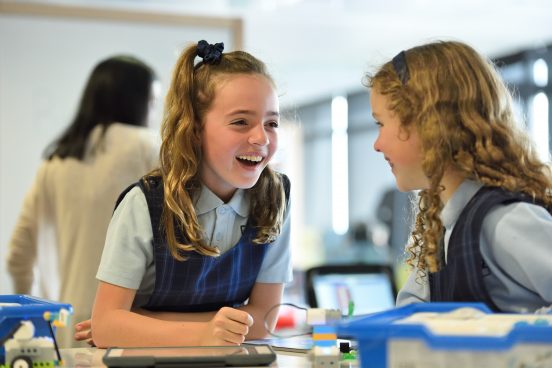In today’s post I wanted to explore ways to help assist student oral proficiency using technology. Multimodal tools such as iPods and iPads are great devices to help assist learners in their French oral development. These mobile devices are useful tools for in class support but also at home for parental support. Mobile technologies are tangible evidence of students’ language learning, which are new ways of language assessment.
Pallerin, in his article, Using mobile technologies to promote authentic oral language learning and new forms of language assessment, described a collaborative action research inquiring the use of iPods and iPads to help promote oral language competencies and new forms of assessing language learning. The research involved Early French Immersion teachers and their students from elementary schools in western Canada. The study included digital observation in the classroom, student artifacts and interview with teachers and students (Pallerin 2013).
There were three key themes that emerged from this study about the understanding on how to authentically use mobile technologies such as iPods and tablets to support French language learners in the classroom.
- More authentic and frequent experiences in using the target language.
Students were reported to enjoy recording their voice during task-based learning activities. Oral activities that were used included recording a description of a picture, and their peer would listen to and try to draw that picture, telling a story based on images, retelling a story, and providing directions to finding a “treasure”. Students also did role playing by video recording how to dress for winter in Canada. In this process students were able to record their video, listen/view and decide whether they wanted to redo the task or not (Pallerin 2013).
According to Pallerin (2013), there are several voice apps for tablet devices that are suitable for a grade one classroom.
- Puppet Pals app, students as young as Grade 1 (six years old) created a puppet show about a princess and a dragon in the target language.
- Voice apps such as Show Me allowed students to annotate their voice recordings, and to demonstrate their understanding of a concept by using a drawing to support their oral answer to a question (Pallerin 2013).
- Promoting the development of oral language skills
According to Pallerin (2013), the use of technological devices such as iPods and iPads allow students the opportunity to revise their language through various activities. This revisiting process teaches students to assess their own learning and set goals to enhance their language development. Pallerin (2013) states that students develop metalinguistic awareness through reflection of their use of the target language. Students became aware of their strengths and gaps in their French vocabulary in activities such as describing a picture or providing instruction. Young learners (e.g., grade one) were able to identify grammar errors (mon maman instead of ma maman). During group work students were able to scaffold together and build vocabulary by looking at an image. Student A points to a picture and says, “la lune”, student 2 corrects student A and says, “non, c’est le soleil”.
- Making the language process more visible to teacher, students and parent
Digital documentation promotes assessment of learning but also for learning, putting greater emphasis on the learning process rather than the learning outcome. It allows for students to self-assess and revise their own work. By doing so learners engage in metacognitive process through self-reflecting. Teachers are then aware of the student’s specific needs and are then able to provide scaffolding to best support their oral competencies (Pallerin 2013).
I’ve had the opportunity to read two of Pallerin’s research articles. His research regarding the use of technology in early French Immersion classes has been integral to my inquiry on ways to best support learners in French Immersion. I appreciated this article as he suggests apps for teachers to use to enhance oral competencies.

https://www.commonsense.org/education/app/puppet-pals-hd
As mentioned in Pallerin’s article, Puppet Pals app was described as a story telling tool to encourage oracy development. According to the app description, it comes in a free or ‘directors cut’ version. In the free version, students have the choice of 8 characters and three backdrops. They are then given a stage where they can create stories and move characters around, before recording their stories. When these are played back it creates a seamless story.
This is a wonderful opportunity for parents to see their child’s work at home and for teachers to assess on their learning. It also is a tool to develop early storytelling and speaking skills. Play is open ended and limited only by children’s imagination. I will try the free version and see whether it will work in my class. In my grade one class, students are inquiring about themselves and their family members. Students are having to describe themselves and their family members (e.g. “me voici”, “voici ma maman”, “voici mon papa”). They are in the process of learning high frequency words and by learning them, they can create a play using the Puppet Pals app!
Have you had the opportunity to try this app? If so, I would love to hear your opinions and reviews on this app!
Until next time, have a wonderful week!
Pallerin, M. (2013, July). Global perspectives on Computer-Assisted Language Learning. In Using mobile technologies to promote authentic oral language learning and new forms of language assessment.




